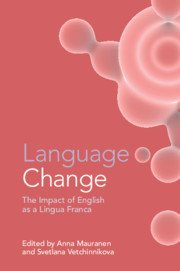Book contents
- Language Change
- Language Change
- Copyright page
- Contents
- Figures
- Tables
- Contributors
- Acknowledgements
- Abbreviations
- Introduction
- Part I Pooling Perspectives
- Part II Zooming in on ELF
- 7 ELF, Language Change, and Social Networks
- 8 ELF and Language Change at the Individual Level
- 9 Are Multilinguals the Better Academic ELF Users?
- 10 The Role of Co-Textual and Contextual Cues for Intelligibility in ELF Interactions
- 11 Exploring the Pragmatics of Computer-Mediated English as a Lingua Franca Communication
- 12 Development of Shared Multilingual Resources in ELF Dyadic Interaction
- 13 The Role of Translanguaging in ELF Advice Sessions for Asylum Seekers
- Index
- References
10 - The Role of Co-Textual and Contextual Cues for Intelligibility in ELF Interactions
from Part II - Zooming in on ELF
Published online by Cambridge University Press: 17 December 2020
- Language Change
- Language Change
- Copyright page
- Contents
- Figures
- Tables
- Contributors
- Acknowledgements
- Abbreviations
- Introduction
- Part I Pooling Perspectives
- Part II Zooming in on ELF
- 7 ELF, Language Change, and Social Networks
- 8 ELF and Language Change at the Individual Level
- 9 Are Multilinguals the Better Academic ELF Users?
- 10 The Role of Co-Textual and Contextual Cues for Intelligibility in ELF Interactions
- 11 Exploring the Pragmatics of Computer-Mediated English as a Lingua Franca Communication
- 12 Development of Shared Multilingual Resources in ELF Dyadic Interaction
- 13 The Role of Translanguaging in ELF Advice Sessions for Asylum Seekers
- Index
- References
Summary
It has been suggested that co-textual and contextual cues do not contribute much to phonological intelligibility in ELF interactions, since many non-native ELF users seem largely unable to draw on such cues when processing each other’s accents (Jenkins 2000). This small-scale, qualitative study investigates the role played by co-textual and contextual information in instances of phonological unintelligibility in ELF interactions. The results suggest that the non-native ELF users in this study tend to ‘interpret’ rather than ‘decode’ the incoming acoustic signal in relation to co-textual and contextual cues, provided they are available. The findings also indicate that such cues are not always beneficial to the listener, as they can also ‘mislead’ them by supporting an incorrect identification of a word.
- Type
- Chapter
- Information
- Language ChangeThe Impact of English as a Lingua Franca, pp. 267 - 290Publisher: Cambridge University PressPrint publication year: 2020
References
- 2
- Cited by

